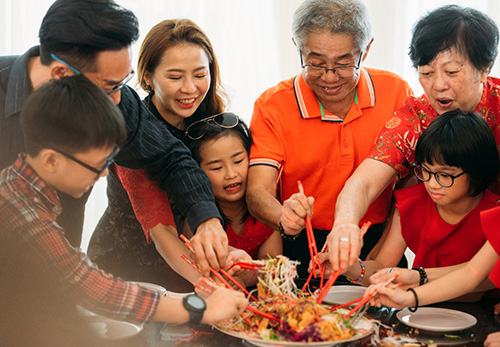As we bid farewell to the recent festivities – the start of 2024, Valentine’s Day, and the Lunar New Year – some of us may feel sad but some may be breathing a sigh of relief.
Many people look forward to festive periods, such as the recent Lunar New Year, as we can put a pause on our daily grind and spend more time with our family and loved ones. However, amidst the bustle, there are some amongst us who may dread these celebrations precisely because of the family reunions.
Family reunions can be a huge source of stress for some of us, especially if we’re not on good terms with our relatives. For those navigating changes in life, such as losing a job, ending a relationship, or experiencing grief and loss, the thought of explaining their situation to relatives could also be very uncomfortable.

Over the years, more people have spoken up about these struggles and their negative impact on our mental health. But although we’ve identified the problem, we may still feel helpless as we don’t know how to solve it.
To support you through this stressful period, we’ve gathered some tips from EMCC’s counselling team on how to deal with difficult family situations.
Q: I dread having family reunions; they give me immense stress and anxiety, but I can’t avoid them either. How can I prepare for the gatherings so that I feel less anxious?
Firstly, you should try to identify what is making you feel stressed or anxious. Thereafter, you could try approaching a trusted relative to talk about these stressors and discuss potential solutions to mitigate them. Even if you couldn’t think of concrete ways to solve the problem, sometimes knowing that a loved one is there to support you can help to reduce the anxiety.
During the gathering, you could focus on having conversations with family members who bring you peace and comfort. If you feel emotionally dysregulated, seek out a private space, such as the toilet, to calm down before rejoining your family.
After the gathering, carry out some self-care activities like drinking your favourite bubble tea, exercising, or spending time with people whose company you enjoy.
Q: When meeting with relatives and family friends, they frequently compare me with others, which lowers my self-esteem. How should I deal with this?
It’s important to remember that you can’t control what others think of you, but you can
control how you see yourself. If you’re self-assured, what they think wouldn’t affect you as much. Try a little gratitude exercise: list down one or two things you’re grateful for, or some of your strengths and accomplishments you’re proud of each day. You’ll slowly find your self-esteem improving and the things others say will stop bothering you.
Sometimes despite the poor delivery, what your relatives say may have value. When you feel more self-assured, you’re also able to better take in and reflect on what they’ve shared. Take away information that would help you to grow and develop. Set realistic goals for yourself to achieve them. Celebrate your progress and achievements along the way.
However, if things continue to be overwhelming despite your best efforts, do seek support from a therapist or counsellor to improve your emotional well-being.
Q: When bombarded with intrusive questions or unsolicited advice, how can I better assert myself and set boundaries?
The urge to respond to such questions with a sarcastic remark might be strong, but it will likely benefit no one to do so. Though they might seem nosey, your relatives may mean no harm and are simply asking from a place of concern. You could respond honestly that you’re uncomfortable with their questions and seek their understanding. Another way would be to respond with humour by making a joke and changing the topic.
If all else fails, politely walk away and find a safe space if the questioning from the relatives is too overwhelming.
Q: My close family member (eg. parent or grandparent) has passed away, and I feel empty and sad during celebrations. Any advice on grappling with the grief during a festive period?
It’s not easy to celebrate when your loved one is no longer around. This is normal and you needn’t try to ignore or hide the grief. Visit their niche and spend time there, acknowledging your longing for them. Talk to supportive friends who are able to empathise with your grief. Do something which you would usually do with your deceased loved one, like hiking, drawing, eating their favourite meal. Jot down your emotions in a journal.
If you feel too overwhelmed to handle the grief alone, and those around you cannot support you sufficiently, try seeking support from a therapist or counsellor.
We hope these tips are helpful, and if you’re ever in need of professional support, we are here for you. For more information on our counselling services, click here.


